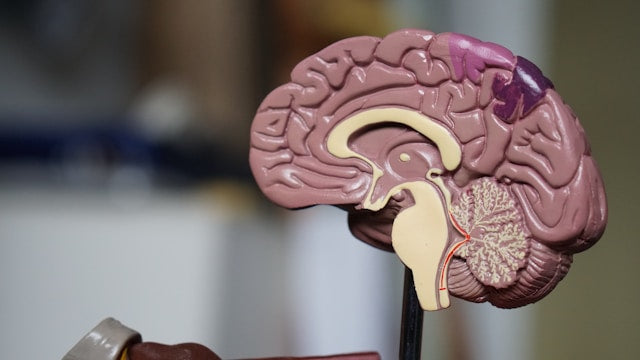This creamy green soup brings together broccoli, cauliflower, and kale for a delicious bowl that feels both comforting and energising. Finished with crispy chickpeas and toasted almonds, it is an easy way to enjoy a whole day’s worth of greens in one simple, nourishing meal.
the gut-brain axis: digestion and cognition are linked.
The Gut-Brain Axis: Unravelling the Connection Between Digestion and Cognitive Health The intricate interplay between our gut and brain, known as the gut-brain axis, has emerged as a fascinating area of research in recent years. This bidirectional communication system influences not only our digestive health but also our cognitive functioning and mental well-being. Let's delve into the profound impact the gut has on cognitive health, including its role in diseases such as Alzheimer's, Parkinson's, and depression. Understanding the Gut-Brain Axis The gut-brain axis comprises a complex network of bidirectional communication pathways involving the central nervous system (CNS), enteric nervous system (ENS), and the gut microbiota. This dynamic interplay enables constant communication between the gut and the brain, influencing various physiological processes, including digestion, mood regulation, and cognitive function [1]. Impact on Cognitive Functioning Research indicates that the gut microbiota plays a crucial role in cognitive functioning, affecting processes such as memory, learning, and decision-making [2]. Disruptions in the gut microbiota composition, known as dysbiosis, have been associated with cognitive impairment and neurodegenerative diseases [3]. Conversely, interventions aimed at restoring gut microbial balance have shown promising results in improving cognitive function and reducing the risk of cognitive decline [4]. Link to Neurodegenerative Diseases Alzheimer's disease and Parkinson's disease, two prevalent neurodegenerative conditions, have been linked to alterations in the gut microbiota and gut-brain axis dysfunction. Studies suggest that changes in gut microbiota composition and increased intestinal permeability may contribute to the pathogenesis of these diseases [5]. Furthermore, emerging evidence suggests that targeting the gut microbiota through dietary interventions or probiotic supplementation could offer therapeutic benefits in managing symptoms and slowing disease progression [6]. Association with Depression Depression, a common mood disorder affecting millions worldwide, has also been linked to alterations in the gut-brain axis. Research indicates that the gut microbiota plays...

The Gut-Brain Axis: Unravelling the Connection Between Digestion and Cognitive Health
The intricate interplay between our gut and brain, known as the gut-brain axis, has emerged as a fascinating area of research in recent years. This bidirectional communication system influences not only our digestive health but also our cognitive functioning and mental well-being. Let's delve into the profound impact the gut has on cognitive health, including its role in diseases such as Alzheimer's, Parkinson's, and depression.
Understanding the Gut-Brain Axis
The gut-brain axis comprises a complex network of bidirectional communication pathways involving the central nervous system (CNS), enteric nervous system (ENS), and the gut microbiota. This dynamic interplay enables constant communication between the gut and the brain, influencing various physiological processes, including digestion, mood regulation, and cognitive function [1].
Impact on Cognitive Functioning
Research indicates that the gut microbiota plays a crucial role in cognitive functioning, affecting processes such as memory, learning, and decision-making [2]. Disruptions in the gut microbiota composition, known as dysbiosis, have been associated with cognitive impairment and neurodegenerative diseases [3]. Conversely, interventions aimed at restoring gut microbial balance have shown promising results in improving cognitive function and reducing the risk of cognitive decline [4].
Link to Neurodegenerative Diseases
Alzheimer's disease and Parkinson's disease, two prevalent neurodegenerative conditions, have been linked to alterations in the gut microbiota and gut-brain axis dysfunction. Studies suggest that changes in gut microbiota composition and increased intestinal permeability may contribute to the pathogenesis of these diseases [5]. Furthermore, emerging evidence suggests that targeting the gut microbiota through dietary interventions or probiotic supplementation could offer therapeutic benefits in managing symptoms and slowing disease progression [6].
Association with Depression
Depression, a common mood disorder affecting millions worldwide, has also been linked to alterations in the gut-brain axis. Research indicates that the gut microbiota plays a significant role in regulating neurotransmitter production and inflammatory responses, both of which are implicated in the development of depression [7]. Moreover, interventions targeting the gut microbiota, such as probiotics and dietary modifications, have shown promise in alleviating depressive symptoms and improving mood [8].
In summary, the gut-brain axis plays a pivotal role in shaping cognitive health and is implicated in the pathogenesis of various neurological and psychiatric disorders. Understanding the intricate connections between the gut and brain opens up new avenues for therapeutic interventions aimed at preserving cognitive function and improving mental well-being.
References:
- Cryan, John F., and Ted Dinan. "Mind-Altering Microorganisms: The Impact of the Gut Microbiota on Brain and Behaviour." Nature Reviews Neuroscience, vol. 13, no. 10, 2012, pp. 701-712. doi:10.1038/nrn3346.
- Foster, Jane A., and Karen-Anne McVey Neufeld. "Gut-Brain Axis: How the Microbiome Influences Anxiety and Depression." Trends in Neurosciences, vol. 36, no. 5, 2013, pp. 305-312. doi:10.1016/j.tins.2013.01.005.
- Pistollato, Francesca, et al. "Role of Gut Microbiota and Nutrients in Amyloid Formation and Pathogenesis of Alzheimer Disease." Nutrition Reviews, vol. 74, no. 10, 2016, pp. 624-634. doi:10.1093/nutrit/nuw023.
- Ho, Luke K., et al. "The Microbiome in Neurodegenerative Disease." Neurobiology of Disease, vol. 109, 2018, pp. 1-2. doi:10.1016/j.nbd.2017.08.002.
- Sampson, Timothy R., and Sarkis K. Mazmanian. "Control of Brain Development, Function, and Behaviour by the Microbiome." Cell Host & Microbe, vol. 17, no. 5, 2015, pp. 565-576. doi:10.1016/j.chom.2015.04.011.
- Cenit, Maria Carmen, et al. "Gut Microbiota and Risk of Developing Celiac Disease." Journal of Clinical Gastroenterology, vol. 49, no. Suppl 1, 2015, pp. S50-S52. doi:10.1097/mcg.0000000000000375.
- Jiang, Haiyin, et al. "Altered Gut Microbiota Profile in Patients with Generalized Anxiety Disorder." Journal of Psychiatric Research, vol. 104, 2018, pp. 130-136. doi:10.1016/j.jpsychires.2018.08.001.
- Kelly, John R., et al. "Transferring the Blues: Depression-Associated Gut Microbiota Induces Neurobehavioural Changes in the Rat." Journal of Psychiatric Research, vol. 82, 2016, pp. 109-118. doi:10.1016/j.jpsychires.2016.07.019.
lifestyle. gut health recipes.
ready in 10 minutes
herb-whipped cottage cheese chicken bagels.
These basil whipped cottage cheese protein bagels make a fresh, high-protein breakfast or lunch, combining creamy herb-blended cottage cheese with juicy chicken, rocket, and tomatoes. They’re quick to assemble, packed with flavour, and perfect for a nourishing breakfast or light lunch.
ready in 10 minutes
kiwi chocolate protein chia pots.
These Kiwi Chocolate Protein Chia Pots make an ideal high-fibre, high-protein breakfast that keeps you full and energised all morning. They’re quick to prepare, easy to store, and perfect for a healthy grab-and-go option.
ready in 15 minutes
spiced apple porridge.
This spiced apple and pumpkin seed porridge is a warming, high-fibre breakfast that’s perfect for cosy mornings. Made with creamy oats, gently caramelised apples and a crunchy pumpkin seed topping, it’s ready in just 15 minutes and serves one.
ready in 50 minutes
prep-ahead baked blueberry oats.
These prep-ahead oven-baked oats with blueberries and bananas are rich in protein and fibre, making them a nourishing, gut-friendly breakfast to enjoy all week.
ready in 15 minutes
spicy green eggs with feta.
These spicy green eggs with feta are a quick, protein-rich recipe packed with gut-friendly ingredients like spinach, courgette, and spring onion. Baked in the oven or air fryer, they’re simple to make, full of flavour, and support digestion with a balance of fibre, protein, and healthy fats. Perfect for breakfast, brunch, or a light meal, this vibrant dish proves that nourishing your gut can be both delicious and easy.
ready in 10 minutes
egg wrap with pesto.
Bright, fresh, and ready in just 10 minutes, this flavour-packed wrap serves one and is ideal for breakfast, lunch, or any time you’re after something simple yet filling.
ready in 10 minutes
peach cobbler overnight oats.
Start your day with a gut-friendly twist on a classic dessert. The peach cobbler overnight oats serve 2–3 and takes just 10 minutes to prepare the night before. Packed with fibre, flavour and feel-good ingredients, it’s the perfect make-ahead option for busy mornings or a nourishing snack you can enjoy any time of day.
ready in 15 minutes
smoky egg salad bagel crunch.
This smoky harissa egg bagel is the perfect 15-minute meal. Made with creamy Greek yoghurt, tangy pickles, and a hint of spice, it’s a high-protein twist on classic egg salad that delivers on both taste and texture. Ideal for busy days, this easy bagel recipe makes lunch feel gourmet without the effort.
ready in 20 minutes
chewy breakfast matcha protein cookies.
Soft, satisfying, and subtly sweet—these breakfast cookies are made to fuel your morning the right way. With fibre-rich oats, plant-based protein, and antioxidant-packed matcha, they’re a gut-friendly grab-and-go option that doesn’t compromise on flavour or function.
ready in 15 minutes
lemon & poppy seed pancakes.
Emily's light, gut-friendly crêpes are the perfect balance of fibre, protein, and healthy fats to support digestion and keep you feeling great.
ready in 10 minutes
carrot cake breakfast oats.
Start your day with a delicious and nutritious breakfast option - Carrot Cake Oats. Filled with fibre diversity to promote healthy digestion.










































